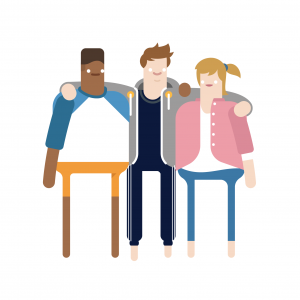We’re more connected than ever, yet feeling more isolated. Loneliness has reached epidemic proportions in Britain. We look at some of the reasons why, and how to deal with loneliness.

In this article:
If You’re Feeling Lonely, You’re not Alone…
We used to think of loneliness as a scourge of the elderly, but sadly it’s a modern-day phenomenon, which is becoming increasingly common amongst people of all ages and backgrounds. More than 9 million people in the UK (close to a seventh of the population) ‘always or often’ feel lonely, with around two thirds feeling uncomfortable admitting it or talking about it. Perhaps surprisingly, young adults (aged 16 to 24) reported feeling lonely more often than any other age group. In fact, young millenials have been described as ‘the most digitally connected, yet socially isolated generation’.
Worryingly, loneliness is a far bigger problem than simply an unhappy emotional experience; research shows it can be as harmful to health as smoking 15 cigarettes a day and can lead to long-term mental and physical illness. The health risks, social concerns and their cost implications have now put the issue firmly on the Government agenda, and they have even appointed a Minister for Loneliness to tackle the problem.
Why are we Lonely?
Loneliness is often triggered by life transitions (e.g. graduation, being a new mum, divorce, bereavement etc.), so it’s not surprising that going to university can leave so many students feeling bereft at times. A recent survey shows that nearly half of UK students (46%) have felt lonely, demonstrating the cruel irony that you don’t have to be alone to feel lonely. Loneliness is a feeling of being ‘disconnected’ from the people around you.
‘It comes a shock when you learn, very quickly, that it’s entirely possible to be surrounded by so many people your own age and to feel almost claustrophobically alone. I spent three years studying design at university. I worked hard, played harder and made friends for life. But my first year in academia was also the most insecure I’ve ever felt.’Sophie, Co-Founder of HelloGrads
The loneliness epidemic is often blamed on the explosion of social media and digitalisation. Technology has provided amazing tools to increase connectivity, facilitate communication and make everything more accessible. Yet paradoxically, its benefits are also its curse – we have allowed it to replace social interaction. In the way we work and shop and socialise and more…

At work, Artificial Intelligence, screen-sharing, remote working and an ever growing myriad of high tech devices allow you to do business without going to the office, without meeting colleagues, or visiting clients.
We do shopping through online sites, self-checkouts and contactless payments – no need to engage with a human.
And what about unsocial social media? Memes, mentions and messaging Facebook friends, have usurped real-life laughs and heart-to-hearts with actual friends; 70% of 16-24-year-olds prefer texting to talking. FOMO is feeding our obsession with social media, but the perception that others lead far more exciting lives, fuels feelings of low self-esteem and loneliness. Compare and despair!
‘The reason we struggle with insecurity is because we compare our behind-the-scenes with everyone else’s highlight reel.’Steve Furtick, American pastor, songwriter & author
Sad that social media was designed to bring people together, yet is leaving us increasingly isolated – connected but unconnected.
How to Deal with Loneliness
Being with others doesn’t mean you’re going to feel connected, just as being alone doesn’t mean you’re going to feel lonely. But humans are social beings, and we have a basic need for meaningful social connection, as important as food and warmth. The good news is that even when we are lonely, we can nurture and build social connections, by reaching out to family and old friends, and by making new friends.
10 Simple Steps towards a Less Lonely Life
Make a plan
Mixing with others may be the last thing you want to do if you’re feeling isolated, but staying in on your own will just make the problem worse. Be reassured that it’s perfectly possible to overcome loneliness by taking active steps, even small ones: set a goal of getting out, at least once a week, into social settings which appeal to you, and will help you meet and bond with other people. Planning is empowering – take responsibility for making the change you want to see.
Choose enjoyable or meaningful activities
Joining groups or activities that interest you is an easy way of meeting like-minded people. You’ll find it easier to connect because you already have something in common, a natural basis for building friendships. Bear in mind that friends are made not found, so put yourself in situations where you see the same people regularly.
You’ll find it easier to connect because you already have something in common, a natural basis for building friendships. Bear in mind that friends are made not found, so put yourself in situations where you see the same people regularly.
Whatever your talents or interests, there will be something to try:
Join a choir – singing has many health benefits and can lift your mood.
Go on a weekly park run – free, open to everyone, all abilities, safe and easy to take part in.
Find a furry companion – dog-walking groups provide a perfect way to exercise, de-stress and make some yappy dogs happy too!
If you’re stuck for ideas, or want to find a local group, check out Meetup.
Do something for someone else
 Helping others makes us feel valued, as well as providing purpose and responsibility. Take on regular volunteer work or just help someone out, like an elderly neighbour or family member.
Helping others makes us feel valued, as well as providing purpose and responsibility. Take on regular volunteer work or just help someone out, like an elderly neighbour or family member.
Find a local conservation group, volunteer at your hospital radio, or combine getting fit with doing something worthwhile at the Good Gym – they organise runs with a mission, including regular visits to an isolated older person.
Find out more about volunteering and opportunities in your area.
Get out and about
Just being around others can help us feel less alone.
Take a walk in the park, visit a museum or gallery, attend a networking event. Go and work or read in public places like a co-working space, the library or a lively café. Try to make small talk about how busy the place is, the background music or the weather (that favourite British topic of conversation!) Head where the chatter is and you’ll start to feel better.
Start something new
Learning something new is very rewarding, great for mental wellbeing and helps us connect with others. If you’re at uni, take advantage of the endless activities, teams, clubs and societies. But whatever your stage of life, there’s no better time to take up a new challenge! Try Spanish or salsa or skydiving, or select something else that rocks your socks!
Or start something fun yourself, which will get people together; Jess, a Bournemouth student, decided to set up a beach-cleaning group via social media. Within a matter of days, she had 100 sign-ups!

Eat together
Cooking and eating together is a great way of building relationships. So instead of chomping a ready-meal for one, offer to make something simple for your housemates or colleagues, or cook together. Try our tasty recipes for a winter warmer soup, bangers and beans or homemade(ish) pizzas. Keep costs down by hosting a supper club where everyone brings a dish. Or if cooking doesn’t ruffle your truffles, suggest a takeaway night and split the costs. See if Deliveroo or UberEats deliver in your area.
However you do it, the company is more important than the cuisine, so no mobiles on the table – talk to each other!
Say ‘yes’ to more things
Keep yourself busy.
Google executive chairman Eric Schmidt advises:
‘Find a way to say yes to things. Say yes to invitations to a new country, say yes to meet new friends, say yes to learn something new. Yes is how you get your first job, and your next job, and your spouse, and even your kids.’Source: The Best Advice I Ever Got by Katie Couric
Do a digital detox
Live your life! Not one through other people.
Phone a friend, meet a mate, enjoy some real human interaction!
Research suggests that limiting social media use to 30 minutes a day can lead to a significant improvement in wellbeing. So swap FOMO for JOMO (Joy of Missing Out) – a practice promoted by Randi Zuckerberg (she’s Mark Zuckerberg’s sister! LOL).
Try these tricks to kick the tech habit (temporarily).
Be aware of others
Everyone feels lonely at times.
When you first move to a new area or job, it can take a good while to really settle in, so don’t worry if you don’t feel great. Certain times can be much worse, like post-Christmas blues, if you have been surrounded by family and close friends who have known you forever.
Tell someone how you’re feeling, even if it’s difficult. Put the shoe on the other foot – if they were telling you they felt sad or lonely, you would want to help. It really is a case of ‘a problem shared is a problem halved’. And don’t make assumptions – even people who seem to have it all together and know absolutely everyone, can still feel lonely inside.
Expect the best, not the worst
Don’t assume everyone else is too busy for conversation or just won’t be interested in you. If you go into a social setting expecting people will ignore you or be unfriendly, it can become a self-fulfilling prophecy; but if you smile and show warmth and kindness, it’s likely to be reciprocated. Simple social interactions can give you positive feelings that build over time.

For the sake of our health and happiness, we need to combat loneliness, by restoring real social interaction with family, friends and colleagues. We should all make an effort to socialise and connect with other people.
Reach out – just start with a smile and a simple hello 🙂
Important
If loneliness is causing you stress or affecting your health, seek professional help from your doctor, or contact one of these helpful resources: Mind, CALM (Campaign Against Living Miserably), or online support community Elefriends.
Find out more about loneliness:
EASE Yourself out of Loneliness
Why misunderstanding loneliness can lead us to the wrong solutions, plus simple steps to help
